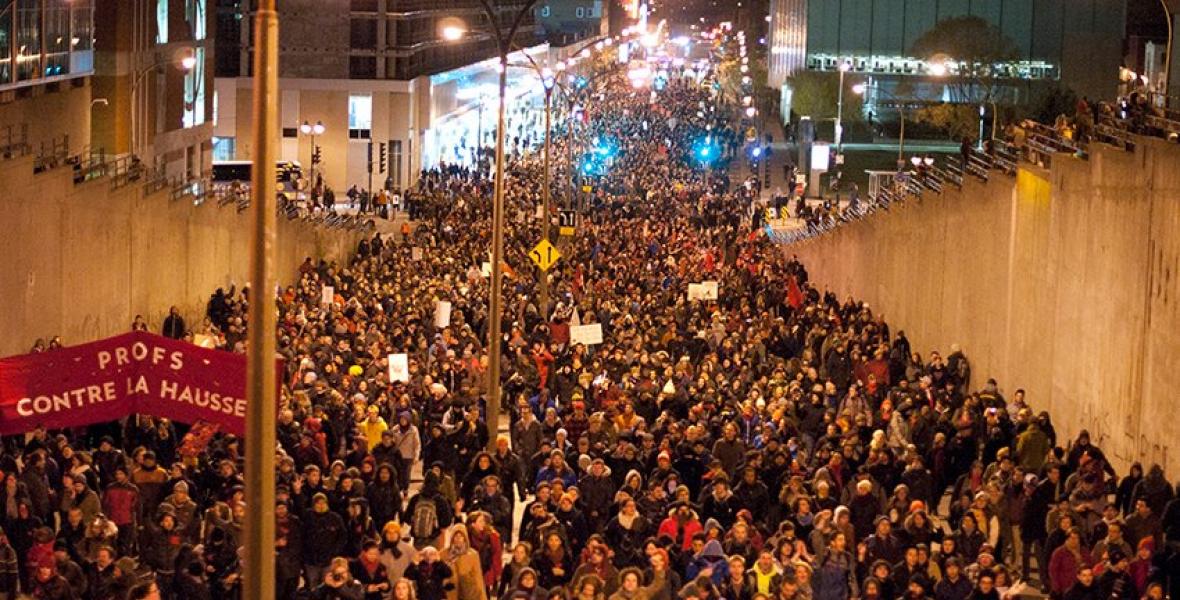Student activism can take many forms, from petitions and hashtag campaigns to marches and guerilla theatre. But such avenues for dissent have one thing in common: A passion for challenging the status quo. Young student organizers are committed to bettering the world they will graduate into by advocating for equality and challenging public opinion.
The most recent showing of McGill’s student activist energy took place on Nov. 12, when close to 100 McGill students gathered at the Roddick Gates and stopped traffic to march down St. Catherine street, eventually joining activist groups from across the city as part of the Manifestation Against Racism and Hate.
Student demonstrations are loud, disruptive, and attention-grabbing. These mass displays of public discontent can influence social and political attitudes toward policy, acting as a check on the government.
A study from the Pew Research Center indicated that 74 per cent of Americans strongly believe that protests are vital to maintaining a healthy democracy. On campuses and beyond, university activism often takes the form of visible protest. In Canada, McGill’s campus in particular boasts of a diverse history of grassroots mobilization against oppression. For example, the Quebec Public Interest Research Group (QPIRG) McGill organizes annual discussions on social issues at their workshop series Culture Shock, Divest McGill staged a 72 hour sit-in outside the James Administration building in 2016 to show their disapproval of McGill’s fossil fuel investments, and Demilitarize McGill led a tour of military research facilities on campus at the 2015 open house. Regardless of the tactics chosen, a common thread in all these activist movements is a commitment to a more equal and just society.
“Activism, for me, is the will to change things,” Connor Spencer, Vice-President (VP) External of the Students’ Society of McGill University said. “The will to point out when things are wrong [….] To believe in something so much that you can put yourself out for it, to engage, to stay engaged, to care about the folks around you and what is happening to the folks around you, to see yourself as part of a larger system, a larger kind of ecosystem of humans and thoughts and feelings and institutions. [To see yourself] as not only a member but also a contributor to the capitalist, patriarchal society that we live in.”
Beyond McGill’s campus, youth have historically served as a main source of energy for a variety of activist movements, from the Greensboro sit-ins in North Carolina during the American Civil Rights movement, to the 1968 student protests in Paris.
Today, in the shadows of the alt-right movement and growing inequality, campus activism is more important to university students than ever. Despite relatively low voter turnout rates for Canadian youth aged 20-24, this age grouping is the most likely to engage in some form of political activism, suggesting that they deem it to be the primary way to initiate political change.
“I think there is this idea of energy,” Spencer said. “[At this age], we are going through a phase in our lives, and especially on university campuses, when a lot of us are having blinders removed, or a shifting of lenses. I think that what comes with that is a realization of what’s going on, and I think that it is very natural for people that are inquisitive to end up at universities and end up studying. [It’s] not that all inquisitive people end up here, there is a certain amount of privilege that goes with it.”
The rich history of activism in Quebec has given university students an opportunity that many McGill students do not know how to take full advantage of. Since the 1960s, Quebec university students have protested a number of issues, including austerity, Islamophobia, and government corruption.
Notably, in 2012, in what was later dubbed the ‘Maple Spring,’ Quebec university students—with the exception of McGill—clashed with the government over a proposed 75 per cent increase in tuition fees, and they were ultimately successful in preventing such hikes. For nearly seven months, student protesters were met with violent backlash from the police, who were armed with pepper spray, batons, and riot gear. In Montreal, the protests reached a peak in May 2012, when students barricaded the streets and lit bonfires, which the police responded to with excessive force. In September of the same year, the newly-elected Parti Québecois came into power, and the proposed tuition increases were scrapped. Since then, when Montreal students have taken action, the government takes notice.
“We have a legacy […] that we directly benefit from, which is that because of the work of our predecessors we’ve been given a huge megaphone,” Spencer said. “I think we don’t really realize that because so much work has been done in the past that the government is kind of afraid of the students and how much they can mobilize.”
Paige Hunter, U3 Arts, understands the power McGill students wield in influencing future politics. In 2016, she joined Generation Screwed at McGill, a non-partisan campus activism group, after learning about Canada’s growing national debt. Today, Hunter is the organization’s campus coordinator.
“Activism stimulates change,” Hunter wrote in an email to The McGill Tribune. “If young people don’t make their voices heard on serious issues that will certainly have an effect in their future, those in charge will not get the message [….] I would like to live in a prosperous, economically-sound country, but we can’t have that if we’re drowning in debt. I think many Canadians want the same.”
For Hunter, campus activism serves a dual purpose: To affect change and to educate the student population on political injustices. Throughout the year, Hunter and her team at Generation Screwed hold events on campus aimed at encouraging students and politicians to take action. Among them, the group organizes documentary screenings and petitions urging candidates running for political office to commit to tackling the Canadian debt crisis.
“I hope young people will have their consciousnesses raised about the Canadian federal debt in terms of understanding how this issue will directly affect their future,” Hunter said. “All the taxpayer dollars that go to servicing the debt could have been used to pay for social services that all Canadians need and want. Better yet, Canadians could have been given a tax break. With this knowledge, perhaps young people will begin to favour political candidates that prioritize a balanced budget.”
Students continue to be on the front-lines of change within society, and their relentless commitment to greater equality impacts both local and national politics. Like Hunter, Spencer emphasized the need for students to take the future into their own hands. She explained that when students are apathetic to injustice, the consequences run deep.
“I think we are living [the cost of being passive],” Spencer said. “When you are passive, you get exploited, and it might not be you specifically right away, or you may not be able to see that you are exploited, but you are being exploited.”
Small steps to get started in activism
If you have 5 minutes… Have a conversation with a friend about an inequality you recognize in society. This is a quick and easy way to express you concerns about what is happening , and brainstorm potential solutions.
If you have 30 minutes… Write a letter to your elected officials or sign a petition. Though it’s not often headline-making, it is possible to do activist work within the existing systems. Many elected officials are accessible via email or phone, and can be swayed by pressure from their constituents. Additionally, these techniques have proven to be valuable mobilization strategies and help to create a list of people who care about the same issues.
If you have an afternoon… Attend a meeting for a group you are passionate about. McGill has a number of student activist organizations which exist within and outside of SSMU. In the past, on-campus groups have been responsible for organizing movements advocating for indigenous rights, environmental protection, and anti-austerity.










“If you have 5 minutes… Have a conversation with a friend about an inequality you recognize in society.”
Why does the recommendation presuppose what it is I may be concerned about and would want to be an activist about? Am I allowed to care or have a conversation about something else? The patronizing tone is irritating.
The superficial article is littered with vague buzzwords. It mentions (in)equal(ity) 5 times without ever clarifying. Equality of what, exactly? Why is (that type of) equality valuable?
Additionally, before one “gets started in activism”, how about: research the issue extensively and make sure your views are well-informed before you go preaching. Seems like it would be an important thing to mention.